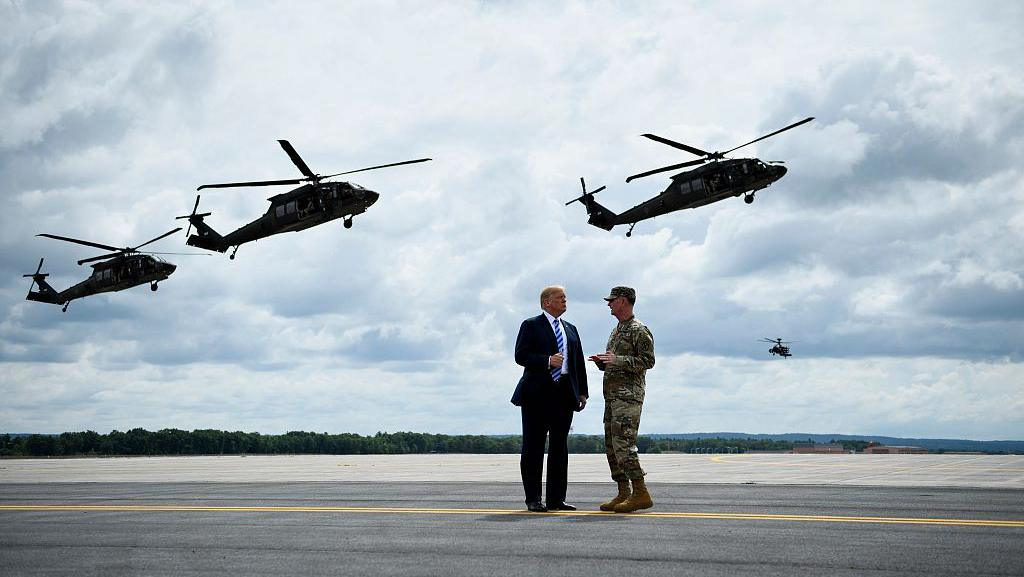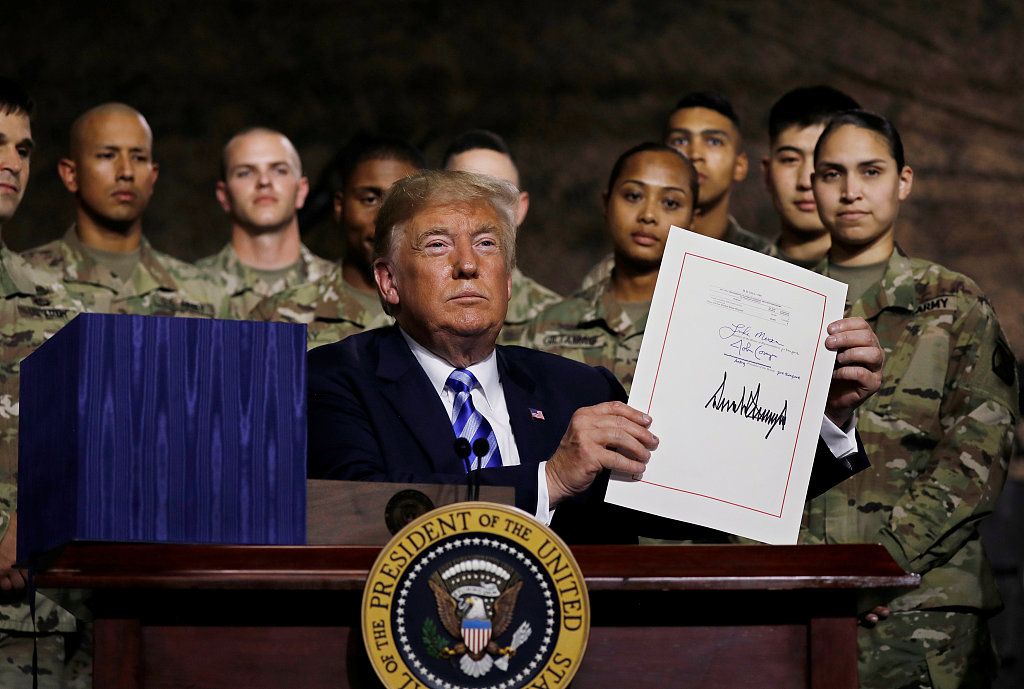
U.S. President Donald Trump (L) watches an air assault exercise with Army Major General Walter Piatt at Fort Drum, New York, U.S., August 13, 2018. /VCG Photo
U.S. President Donald Trump (L) watches an air assault exercise with Army Major General Walter Piatt at Fort Drum, New York, U.S., August 13, 2018. /VCG Photo
Editor's note: Tom Fowdy graduated from Oxford University's China Studies Program and majored in politics at Durham University, writes about international relations focusing on China and the Democratic People's Republic of Korea. The article reflects the author's opinions and not necessarily the views of CGTN.
On Monday night the Wall Street Journal reported that leading representatives from parties in the United States Congress had agreed on the text of the annual National Defense Authorization Act (NDAA), the article added that both parties were now seeking to include a provision within it to ban the use of federal funds to purchase Chinese manufactured transport assets, including buses and railway cars, and bar the U.S. military from purchasing China-made drones.
The bill will have significant implications on U.S. local government who may rely on federal subsidies to purchase such provisions, as many cities in the United States rely on Chinese suppliers, including major ones such as Boston and Chicago. This stipulation comes despite President Trump's aim to secure a trade deal between the two countries, becoming the latest move by Congress working in unison to disrupt relations between the two, following provisions on Hong Kong and Xinjiang.
However, seasoned observers of the NDAA shouldn't be surprised. With it being the biggest and most important annual act of Congress, overseeing all U.S. military spending and funding allocations, the act has effectively become a vehicle for anti-China provisions year on year.
Hawkish congressmen have looked repeatedly into ways they can use the financial power of the American defense complex to forcibly deprive companies, organizations and governments at the grassroots level from doing business with China.
Now, transport may be set to take the hit. However, in doing so, the move will be costly to the United States. They won't be able to find a cheaper supplier, nor will they be able to manufacture their own at the same price.

U.S. President Donald Trump holds up the National Defense Authorization Act after signing it in front of soldiers from the U.S. Army's 10th Mountain Division at Fort Drum, New York, U.S., August 13, 2018. /VCG Photo
U.S. President Donald Trump holds up the National Defense Authorization Act after signing it in front of soldiers from the U.S. Army's 10th Mountain Division at Fort Drum, New York, U.S., August 13, 2018. /VCG Photo
What Trump did not realize a year ago when he opened his trade war against China was that he unleashed forces he would soon lose control of. The president inadvertently moved hawkish congressmen with neoconservative dispositions into the political center ground.
While the president is open to some form of compromise with Beijing, individuals such as Marco Rubio are not and seek full-on geopolitical confrontation. Now a year later, its impact is being felt. As Trump battles to close a trade deal with Beijing, he suddenly finds his own agenda being disrupted by Congress in a non-cooperative way.
Defense funding may also prove to be his latest setback. As set out in the U.S. Constitution, Congress is the body that holds the power of the purse and has the right to allocate and oversee U.S. government funding.
Every year, it passes a bill known as the National Defense Authorization Act, a bill that sets out over 1.2 trillion U.S. dollars spanning the entire American military and all its associated provisions. It also, most crucially, sets out how defense and security policies influence funding based on non-military provisions that can extend to pretty much anything.
Inevitably, this means the bill, since a year ago, has become a vehicle for anti-China provisions. In 2018, the NDAA limited university research ties with Huawei and accordingly set out funding cuts for any universities hosting Confucius Institutes, forcing a spree of closures across the country.
Now in the 2019 version, more provisions are included: a ban on the use of federal funding to purchase Chinese manufactured train cars and buses and barring the U.S. military from buying Chinese drones. To make grounds for this stipulation, many U.S. Congressmen made ludicrous accusations that Chinese manufactured trains were conducting "espionage," something which has no evidence whatsoever.
The move will force American local governments who seek federal subsidies for such infrastructure to look elsewhere. However, it will raise their costs astronomically. Due to the mass demand and supply rates of Chinese providers, no other country can compete with their prices realistically.
Japan might be an alternative, but it will be far more expensive. The price of manufacturing them in the U.S. will be even higher and will not compliment the U.S. industry in the way protectionists believe. Trump is already hammering tariffs on steel imports from around the world. The result will be an astronomical rise in costs, and thus, less money for improvement in the overall quality of the infrastructure.
Therefore, as a whole, this act is yet another petty move designed to take cheap shots at China. Hawkish congressmen are driving forward the logic of "decoupling" contrary to the will of the presidency.
As Trump seeks a deal, he really needs to think about the atmosphere he has created at home and needs to place the stabilization of relations between the two countries as a priority to push the hawks back into the fringes. If not, then this entourage of anti-China bills is not going to stop. Americans will be the ones paying the price for it.
(If you want to contribute and have specific expertise, please contact us at opinions@cgtn.com)